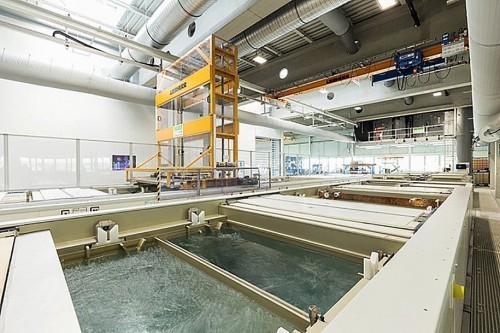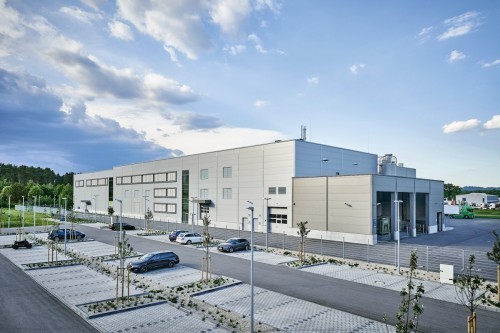Decker Anlagenbau and the Fuchs family of companies offer solutions from a single source - site search, development, construction around the core. And in the end, many factors flow into a well-rounded plant concept.
An entrepreneur who wants to wet-chemically treat surfaces on an industrial scale is faced with many tasks of considerable importance. Decker Anlagenbau from Berching in Bavaria can help with over 60 years of experience - and with the range of services offered by the Fuchs family of companies. It can offer a complete plant location from a single source. This saves the entrepreneur a lot of tedious "legwork" and above all: a lot of time.
 Surface treatment plant at Liebherr Aerospace in LindenbergPlant construction- this involves chemical media, parts transport, manual and automated solutions, usually tailored to a very specific requirement profile. Pickling passivation, partial coating, electroplating, anodizing, phosphating and much more: experience in this field also brings with it a wealth of knowledge about the surrounding areas. First of all, this means the system peripherals. Water supply, waste water treatment, exhaust air, parts transport and chemical supply are the organs that the heart of the plant needs to work in sync.
Surface treatment plant at Liebherr Aerospace in LindenbergPlant construction- this involves chemical media, parts transport, manual and automated solutions, usually tailored to a very specific requirement profile. Pickling passivation, partial coating, electroplating, anodizing, phosphating and much more: experience in this field also brings with it a wealth of knowledge about the surrounding areas. First of all, this means the system peripherals. Water supply, waste water treatment, exhaust air, parts transport and chemical supply are the organs that the heart of the plant needs to work in sync.
Immission control and building regulations
Further challenges lie in the legal requirements: What does the plant operator need for a federal immission control permit, which aspects of building regulations are relevant? Since Decker has been building systems, regulations have changed time and again, resulting in new framework conditions and requirements for products and processes.
At which location is which project eligible for approval? How do the surroundings, land-use plans or the quantity (or better: the volume) of water-polluting substances in use influence the question of whether, how and where a plant operator may build? For example, the floor tray that collects chemical media if one of the tanks should break down must be much larger for a plant in a nature reserve than outside - "and that is still one of the simplest requirements," says Bernhard Hilliges, Managing Director at Decker.
Water recovery
Sustainable principles are also increasingly coming into play. According to Hilliges, his company recently built a plant in Russia where the wastewater has to be treated in an evaporation plant before the residues are disposed of by a specialist company. The advantages: solid water protection and a high level of recovery of the precious resource water for further use in the process. Of course, this raises the question of energy supply - here too, modern, practicable and affordable solutions are required. "TheCO2 footprint will increasingly concern us and our customers in the future," says Hilliges. In order to meet all official regulations, energy efficiency requirements and funding programs, but also to be able to optimally integrate plant and occupational safety into production, a building that is tailored to the plant is a guarantee for smooth internal logistics and low conflict potential. Work platforms, escape routes and crane runways can be perfectly planned and installed. This is why Hilliges greatly appreciates the fact that he and Decker Anlagenbau are part of the Fuchs family of companies. This owner-managed association of medium-sized companies has specialized in many facets of the construction sector for more than 70 years, and they interlock seamlessly.
Everything from a single source - location, hall, system
 Coherent concepts from a single source Surface treatment plant at Liebherr Aerospace in LindenbergTheFuchs principle lies in in-depth value creation. "If you want, you can get everything from a single source from the company family: location, planning coordination, approvals, turnkey construction and, at the center, the plant, which we design and set up in parallel with the development phase," says Hilliges.
Coherent concepts from a single source Surface treatment plant at Liebherr Aerospace in LindenbergTheFuchs principle lies in in-depth value creation. "If you want, you can get everything from a single source from the company family: location, planning coordination, approvals, turnkey construction and, at the center, the plant, which we design and set up in parallel with the development phase," says Hilliges.
Customers who opt for this type of solution save time and gain security. It starts with the fact that Fuchs either already has the right location in its real estate portfolio or efficiently searches for and finds the "perfect spot".
Quickly ready to make a decision
Right at the start of the planning phase, the investor receives a reliable estimate of the cost and time frame of the planned construction thanks to the Fuchs construction method with sophisticated Fuchs prefabricated system components from the company's own prefabrication plants. "This gives the investor a solid basis for his decision at a very early stage," says Andreas Schmid from Fuchs Systemgebäude, who is responsible for planning coordination. Serial construction has another interesting aspect when it comes to eligibility for subsidies: since July, the state has been subsidizing non-residential buildings built to BEG standards 55 or 40.
While the system designers at Decker rush to the digital drawing board, the foxes take care of the building preparation and official approvals. "The customer benefits from the one-stop shop principle," says Managing Partner Robert Fuchs.
Safe from surprises
The next advantage of the system construction method: Fast implementation on the construction site. The high degree of prefabrication of the elements and their consistently high quality avoid time-consuming surprises on site. This means that the hall and facility can grow together in harmony.
An alternative to new construction, which may require less capital investment, is the search for, acquisition and structural adaptation of an existing property. "With our wide-ranging experience and contacts in this area, we can find and develop a very good location for pretty much any requirement profile," says Robert Fuchs. He believes that new buildings must also think beyond the current usage profile. "A property should be able to adapt to the needs of its user," he says.


